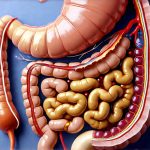The intricate connection between our physical and mental wellbeing is becoming increasingly apparent, with research consistently highlighting the gut as a central player in this dynamic relationship. For decades, mental health disorders were largely attributed to imbalances within the brain itself – neurotransmitter deficiencies, structural abnormalities, and genetic predispositions took center stage. However, emerging evidence reveals that what’s happening in our digestive system profoundly impacts how we think, feel, and behave. This isn’t merely a conceptual shift; it opens up exciting new avenues for understanding, preventing, and treating conditions like anxiety, depression, and even neurodevelopmental disorders.
The gut, often referred to as the “second brain,” is home to trillions of microorganisms – bacteria, viruses, fungi, and archaea collectively known as the gut microbiome. These microbes aren’t simply passive inhabitants; they actively participate in vital bodily functions, from digesting food and synthesizing vitamins to modulating our immune system and influencing neurological processes. When this delicate ecosystem becomes disrupted—leading to dysbiosis – it can trigger inflammation, which is now recognized as a significant underlying factor in many mental health disorders. Understanding the pathways through which gut inflammation impacts the brain is crucial for holistic health management.
The Gut-Brain Axis: A Two-Way Street
The communication between the gut and the brain isn’t one-directional; it’s a complex, bidirectional network known as the gut-brain axis. This axis utilizes multiple pathways to facilitate constant dialogue between these two critical systems. One primary route is the vagus nerve, a long cranial nerve that directly connects the gut to the brainstem. Signals originating in the gut – whether related to microbial activity, inflammation, or nutrient absorption – travel along the vagus nerve, influencing brain regions involved in mood regulation, stress response, and cognitive function.
Another key pathway involves the immune system. The gut houses approximately 70-80% of the body’s immune cells. When gut inflammation arises due to dysbiosis or other factors, it activates the immune system, releasing inflammatory molecules called cytokines. These cytokines don’t stay confined to the gut; they enter the bloodstream and can cross the blood-brain barrier, impacting brain function and contributing to neuroinflammation – a hallmark of many mental health disorders. Furthermore, the microbiome itself influences immune development and regulation, essentially “training” the immune system from an early age.
Finally, the gut microbiome produces neurotransmitters—chemical messengers that play crucial roles in mood and cognition. Serotonin, often dubbed the “happiness hormone,” is largely synthesized in the gut. Other neurotransmitters like dopamine, GABA, and norepinephrine are also influenced by microbial activity. Alterations in the microbiome can therefore directly impact neurotransmitter levels, potentially contributing to mental health symptoms. The interconnectedness of these pathways underscores the profound influence of gut health on brain health. Tools that link gut health and mental well-being are becoming more readily available.
Inflammation: The Common Denominator
Chronic inflammation is no longer viewed as simply a consequence of injury or infection; it’s increasingly recognized as a central feature in many chronic diseases, including mental health disorders. In the context of gut health, inflammation can stem from several sources: a diet high in processed foods and sugar, chronic stress, antibiotic use (which disrupts the microbiome), leaky gut syndrome (increased intestinal permeability allowing toxins to enter the bloodstream), and imbalances within the microbial community itself.
When inflammation persists chronically, it leads to systemic effects that impact brain function. Neuroinflammation—inflammation specifically within the brain – impairs synaptic plasticity (the brain’s ability to form new connections), disrupts neurotransmitter signaling, and ultimately contributes to cognitive impairment, mood disturbances, and behavioral changes. Studies have shown elevated levels of inflammatory markers in individuals with depression, anxiety, and even schizophrenia. Addressing gut inflammation is therefore a critical step towards mitigating its impact on mental wellbeing. Can gut inflammation lead to other health concerns?
Identifying Gut Inflammation & Dysbiosis
Pinpointing the presence of gut inflammation and dysbiosis isn’t always straightforward, as symptoms can be varied and often overlap with other conditions. Common indicators include:
- Digestive issues such as bloating, gas, diarrhea, constipation, or abdominal pain
- Fatigue, even after adequate sleep
- Skin problems like eczema or acne
- Joint pain
- Mood swings, anxiety, or depression
- Food sensitivities
However, these symptoms aren’t definitive. More accurate assessment requires a combination of methods:
- Comprehensive Stool Analysis: This type of testing provides detailed information about the composition of your gut microbiome, identifying imbalances and potential pathogens. It can also measure markers of inflammation in the gut.
- Blood Tests: Certain blood tests can assess levels of inflammatory markers like C-reactive protein (CRP) and cytokines, providing an indication of systemic inflammation.
- Dietary Assessment: Evaluating dietary habits is crucial, as diet plays a significant role in shaping the microbiome and influencing inflammation.
It’s essential to work with a healthcare professional experienced in functional medicine or integrative health to interpret these tests accurately and develop a personalized plan.
Dietary Strategies for Reducing Gut Inflammation
One of the most powerful tools for managing gut inflammation is dietary modification. A diet focused on nourishing the microbiome and reducing inflammatory triggers can have a profound impact. Here are some key strategies:
- Increase Fiber Intake: Fiber feeds beneficial gut bacteria, promoting diversity and resilience. Good sources include fruits, vegetables, whole grains, legumes, and nuts/seeds.
- Limit Processed Foods & Sugar: These foods contribute to inflammation and disrupt the microbiome.
- Incorporate Anti-Inflammatory Foods: Include foods rich in omega-3 fatty acids (salmon, flax seeds), antioxidants (berries, green tea), and polyphenols (olive oil, dark chocolate).
- Consider Elimination Diets: Identifying food sensitivities can be helpful. A temporary elimination diet—removing potential triggers like gluten, dairy, or soy – followed by reintroduction can reveal problematic foods.
- Embrace Fermented Foods: Yogurt (with live cultures), kefir, sauerkraut, kimchi, and kombucha are rich in probiotics– beneficial bacteria that can help restore a healthy microbiome.
Dietary changes should be gradual and personalized, taking into account individual needs and tolerances. Understanding Esophagitis is also important for overall digestive health.
The Role of Probiotics & Prebiotics
While dietary changes form the foundation of gut health, probiotics and prebiotics can offer additional support. Probiotics are live microorganisms that, when consumed in adequate amounts, confer a health benefit to the host. They can help restore microbial balance, reduce inflammation, and enhance immune function. However, it’s crucial to choose probiotics carefully, as different strains have different effects.
Prebiotics, on the other hand, are non-digestible fibers that act as food for beneficial gut bacteria. They promote the growth and activity of these microbes, fostering a healthy microbiome. Good sources of prebiotics include onions, garlic, asparagus, bananas, and oats. Combining probiotics and prebiotics – known as synbiotics – can create a synergistic effect, maximizing their benefits. Introvert lifestyle may also influence digestion. It’s important to remember that probiotic supplementation isn’t always necessary for everyone; a fiber-rich diet often provides sufficient prebiotic support. Consulting with a healthcare professional is advisable before starting any new supplement regimen. The link between gut inflammation and trapped gas should also be considered.


















